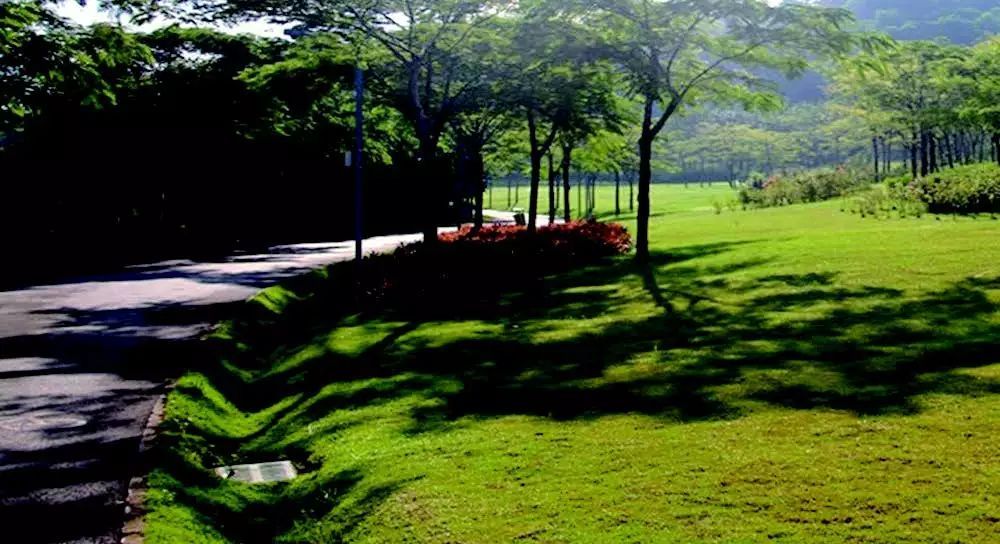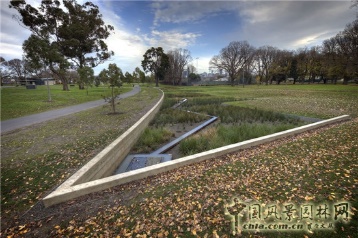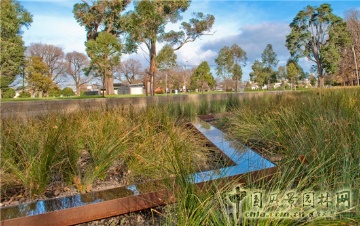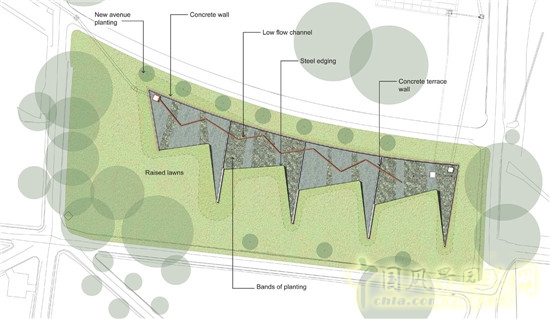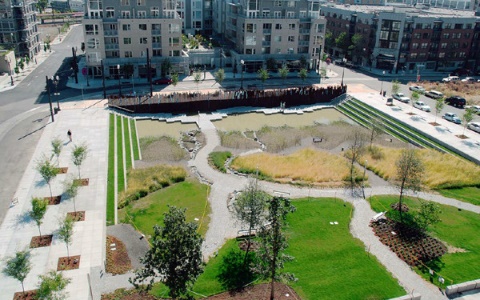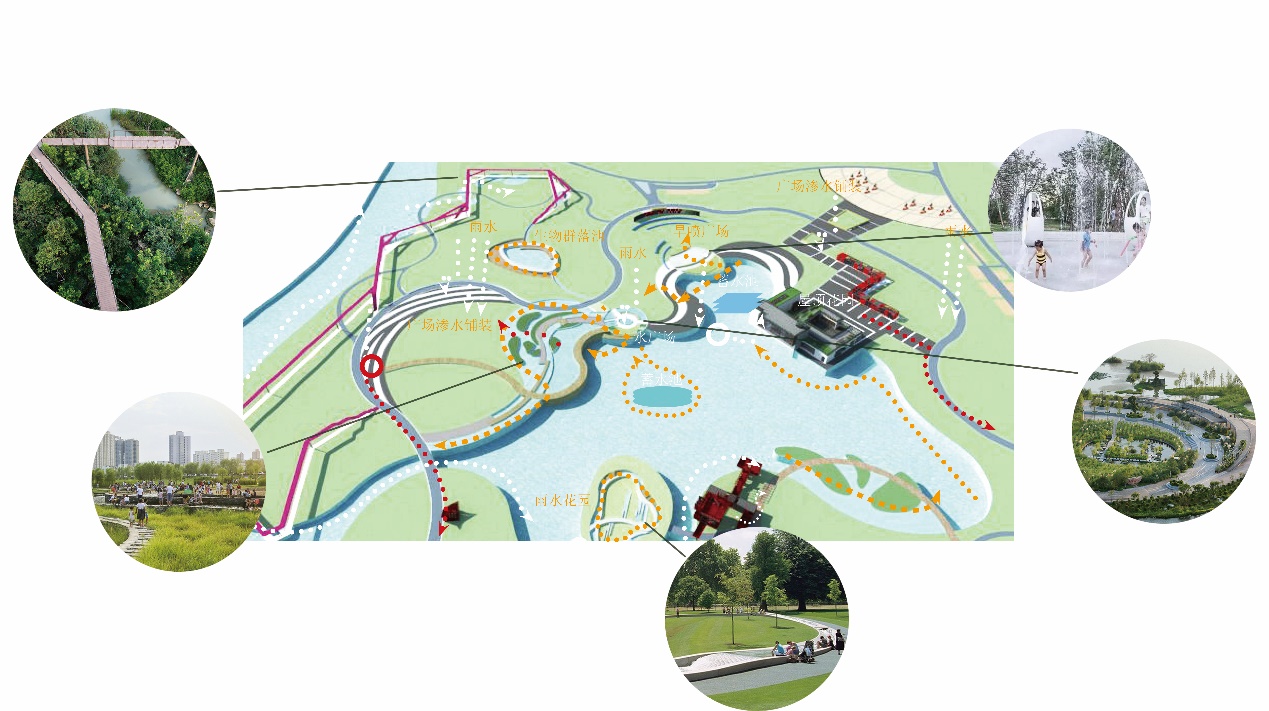泉河生态公园总体规划设计——生态设计毕业论文
2020-04-23 20:07:48
摘 要
随着现代社会的不断进步以及民众的生活水平的提升,人们对周边的生活环境要求也越来越高。建设生态型城市和周边的生态型绿地公园已经成为景观规划里的设计重点和未来的趋势,现在可持续性的设计不断出现并且已经开始广泛应用于城市景观设计领域中。场地中生态的水循环是生态绿地中不可以缺失的部分,在整体生态设计中表现得越来越重要。本文以泉河生态公园总体规划设计为背景,以生态设计作为研究的对象,其中生态设计包括了景观水循环系统设计和绿地植物设计。通过调查和分析,总结景观水循环配置原则和雨水循环收集和处理模式以及发展的目标。
本文通过对生态公园水循环的相关理论和设计手法进行综述,结合国内外的生态景观设计案例,论述绿地水循环的策略方法在景观设计过程中的集体应用。
本文第一章内容主要从雨水的收集和处理利用这些方面的价值和意义结合国内外的雨水处理利用的发展现状进行论述;第二章主要论述生态景观设计的要点,浅谈对场地内植物的选择和搭配;第三章为具体论述绿地雨水收集处理利用一系列的方式和设计手法;第四章简述国外成功的案例;第五章对本次泉河生态公园的总体生态设计进行简单描述。
关键词:生态设计 雨水循环系统 雨水花园 生态绿地
General Planning and Design of Quanhe Ecological Park-Ecological Design
Abstract
With the continuous progress of modern society and the improvement of people's living standards, people's requirements for the surrounding living environment are getting higher and higher. Constructing eco-city and surrounding eco-green parks has become the design focus and future trend in landscape planning. Now sustainable design is emerging and has begun to be widely used in the field of urban landscape design. The ecological water cycle in the site is an indispensable part of the ecological green space, which is becoming more and more important in the overall ecological design. This paper takes the overall planning and design of Quanhe Eco-Park as the background, and takes ecological design as the research object. The ecological design includes the design of landscape water circulation system and the design of green plants. Through investigation and analysis, this paper summarizes the principles of landscape water circulation allocation, the collection and treatment mode of rainwater circulation and the development goals.
This paper summarizes the related theories and design methods of water cycle in ecological parks, and discusses the collective application of strategies and methods of green water cycle in the process of landscape design combined with domestic and foreign ecological landscape design cases.
The first chapter of this paper mainly discusses the value and significance of rainwater collection and treatment, combined with the development status of rainwater treatment and utilization at home and abroad; the second chapter mainly discusses the main points of ecological landscape design, and briefly discusses the selection and collocation of plants in the site; the third chapter specifically discusses a series of ways and design methods of rainwater collection and treatment and utilization in green space; the fourth chapter mainly discusses the main points of ecological landscape design. Chapter 5 gives a brief account of the rainwater utilization in the ecological design of Quanhe Eco-Park.
Key words: ecological design; rainwater circulation system; rainwater garden; ecological green space
目录
摘要…………………………………………………………………….. Ⅰ
Abstract……………………………………………………………….. Ⅱ
- 生态绿地雨水循环利用的分析………………………………1
1.1生态绿地水循环的的概括……………………………………………………1
1.1.1雨水收集和管理…………………………………………………….1
1.1.2水循环系统的再造…………………...……………………………...1
1.1.3人工湿地系统设计……………………………………………………1
1.1.4创造生物多样性……………………………………………………2
1.1.5水循环系统景观价值…………………………………………………2
1.1.6水循环系统经济价值…………………………………………………3
1.2国内外相关案例研究…………………………………………………………3
1.2.1国外雨水利用现状……………………………………………………3
1.2.2国内雨水利用现状…………………………………………………….3
1.3章小结…………………………………………………………………………...4
- 景观生态设计要点……………………………………………………..5
2.1生态设计的策略与方法………………………………………………………...5
2.2注重观赏者的体验感…………………………………………………………...5
2.3植物的配置……………………………………………………………………...5
2.3.1植物配置在绿地设计中的作用……………………………………….5
2.3.2优先种植乡土植物…………………………………………………….6
2.3.3充分体现植物的多样性……………………………………………….6
2.3.4选择耐水淹和污染的植物…………………………………………….6
2.3.5植物的配置具有较高的观赏性……………………………………….6
2.4章小结…………………………………………………………………………...7
- 生态公园雨水处理的方式……………………………………………8
3.1增加雨水下渗…………………………………………………………………..8
3.1.1渗水地面和密集植被滞留……………………………………….…...8
3.1.2下凹绿地和植物浅沟…………………………………………………8
3.2收集雨水,提供公园用水…………………………………………..…………8
3.2.1屋顶花园………………………………………………………………8
3.3雨水的分流……………………………………………………………..……9
3.4章小结…………………………………………………………………..……9
- 绿地生态设计相关案例……………………………………………...10
4.1墨尔本爱丁堡雨水花园……………………………………………………...10
4.2日本爱知县名古屋市绿区梨树公园…………………………………...……10
4.3美国唐纳溪水公园………………………………………………………...…10
4.4章小结……………………………………………………………………...…11
- 泉河生态公园生态设计简述…………………………………….…12
5.1设计简介…………………………………………………………………...…12
5.2生态区设计说明.…………………….………………………………………12
5.3种植设计………………….……………………………………..……………13
5.4设计总结………………….……………………………………………..……14
- 小结………………………………………………………………………16
参考文献………………………………………………………………...…………17
致谢……………………………………………………………………….…………19
第一章 生态绿地雨水循环利用的分析
1.1生态绿地水循环的概括
1.1.1雨水收集和管理
水是景观设计中的一个重要的元素,大面积的景观水体占用了大量的水资源而且随着城市化的日益发展天然的绿地面积缩减,水循环被堵截后地下水没法获得补偿再加上地下水的大量开采,由于城市的硬质铺装增多后无法全部通过土壤自然下渗来补充地下水系,久而久之就导致底下的压力失去平衡,会由此带来很多严重的恶果,不利用人类的可持续的发展。所以在景观设计中要带着可持续发展的理念到设计,对景观设计中水资源进行重生利用对整体的水循环系统进行更新设计,重视雨水管理在设计中的表达将很大程度上节约景观用水中水源的投入。
生态设计中的雨水循环可以通过截留存储的方式进行收集,同时使用渗水铺装通过地表雨水的渗透来进行雨水收集同时也可以直接用来补充地下的水系,可以缓和地下水位下沉带来的多种环境问题。生态水循环系统将会大程度上减少对水资源的浪费,预处理过的水可以用来进行植物的灌溉、经过一系列净化流程的水也可以用来作为景观用水等。设置雨水收集的蓄水池在暴雨的情况下可以暂时储存一部分雨水缓解了的排水系统的压力。
相关图片展示:
